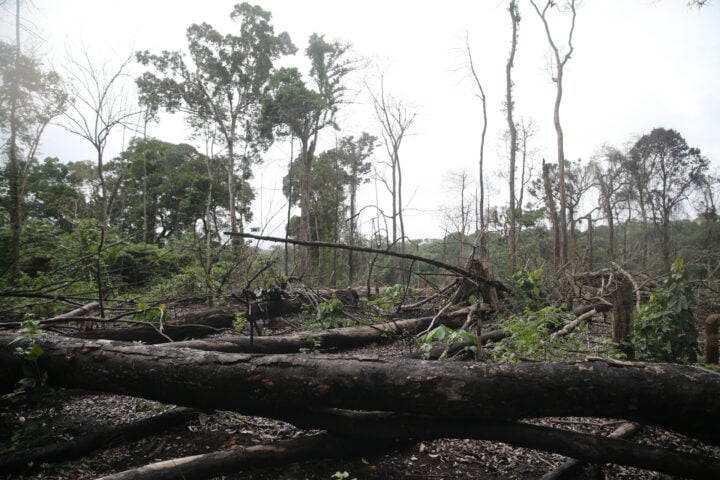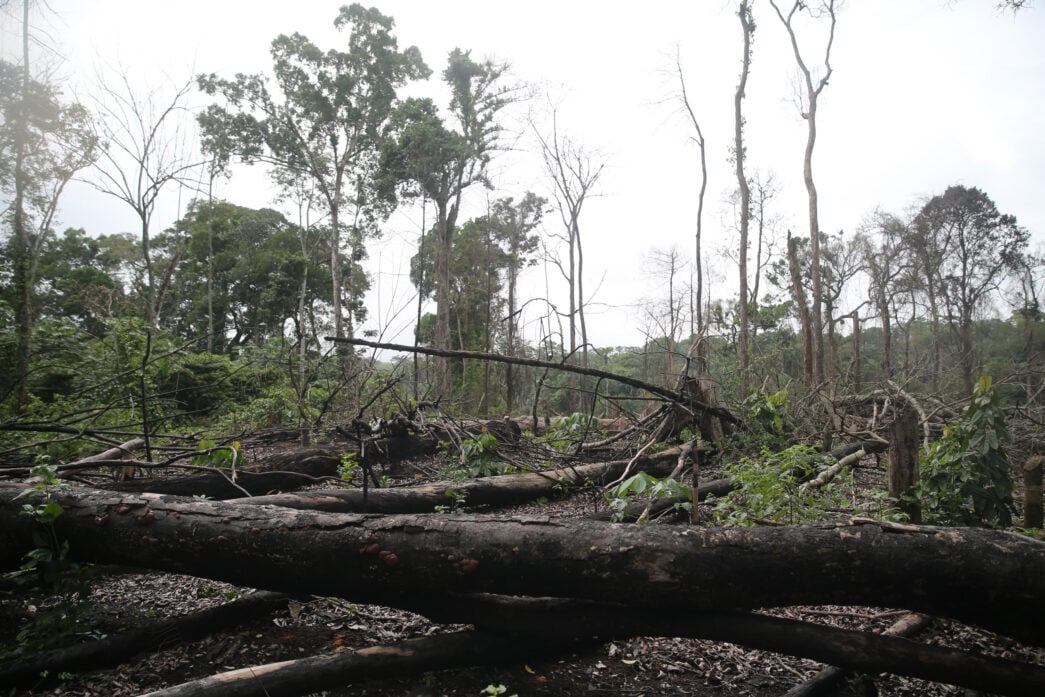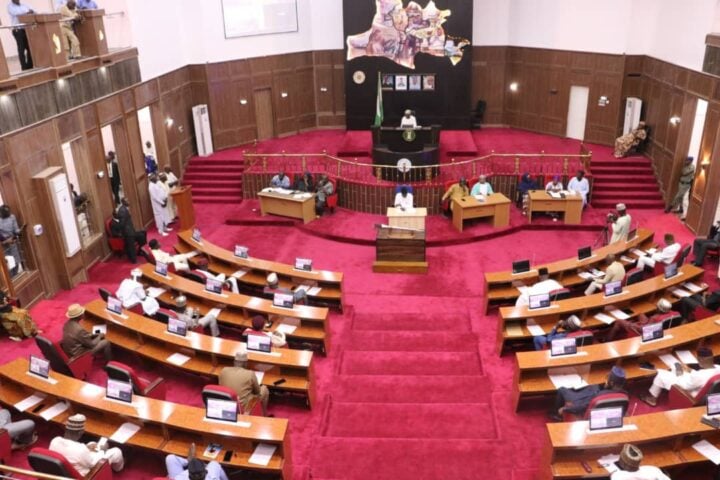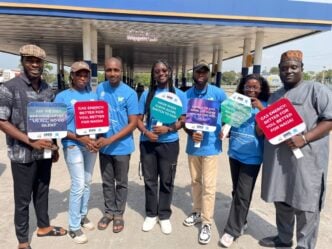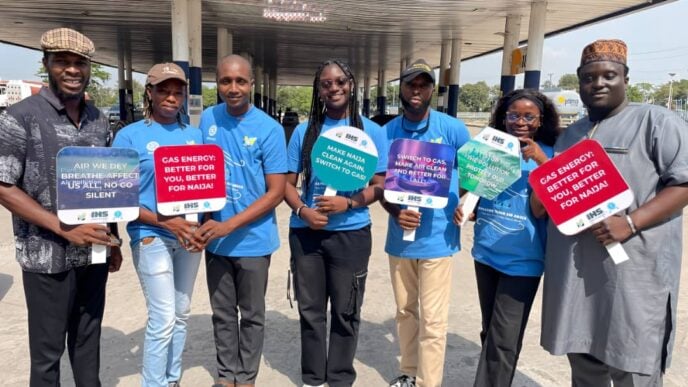Felled trees, cut off from their roots in a deforested part of the Agoi-Ibami forest in Cross Rive state, Nigeria, July 21, 2025. Photograph Akintunde Akinleye/CCIJ
BY UCHENNA IGWE
Thick clouds gathered over Okwabang, Cross River state in Southern Nigeria. The skies rumbled, letting down the rain that barely lasted 15 minutes. Patrick Obi sighed, unimpressed by the meagre offering that had eclipsed his hopes of a heavy downpour. It wasn’t always like this, he says, recalling memories of intense rainfall from the years before.
“When I was tender [younger], around this time, I believe we hardly got clear skies because it was always raining. Over time now, we have not had that intense rain. The weather used to be very cold before, but now there are days we feel the heat as if we are in the northern part of the country,” he said. “People have to come out at night to sleep outside, while some will open their windows for ventilation.”
Obi described the situation as “the aftermath of deforestation” in his community, a view supported by the World Resources Institute (WRI), a global agency focused on environmental protection.
Advertisement
“Removal of forest cover, especially in the tropics, increases local temperatures and disrupts rainfall patterns in ways that compound the local effects of global climate change, threatening severe consequences for human health and agricultural productivity,” the WRI notes in its 2022 report on the effects of deforestation on climate.
A biodiversity belt that once stretched across the country’s south, Patrick’s Cross River State holds much of what is now left of Nigeria’s tropical rainforest, nestled within a national park and 13 forest reserves. It is home to a vast number of lucrative tree species, including mahogany, ebony, opepe, apa, bomba and African bush mango, which is known locally as ogbono. However, these forests are fast disappearing due to massive logging operations by businesses and individuals across the state.
Between 2001 and 2024, the state lost more than 540 square miles of its tree cover, about the size of the city of Los Angeles, according to Global Forest Watch, which uses satellite data to monitor the world’s forests. The loss is due to illegal and unregulated logging operations across the state by businesses, groups and individuals who have besieged the communities with chainsaws, thinning out the forests and threatening biodiversity.
Advertisement
Logging in Cross River communities is as old as the forests themselves. Here, many families rely on the forest economy for food, medicine, firewood, housing and other essential uses.
“We survive on economic trees like cocoa, ogbono trees and the rest. That is the only source of our income. It is what we use to feed and train our children,” Chief Genesis Aria of Butatong community in Boki local government area told the Centre for Collaborative Investigative Journalism (CCIJ).
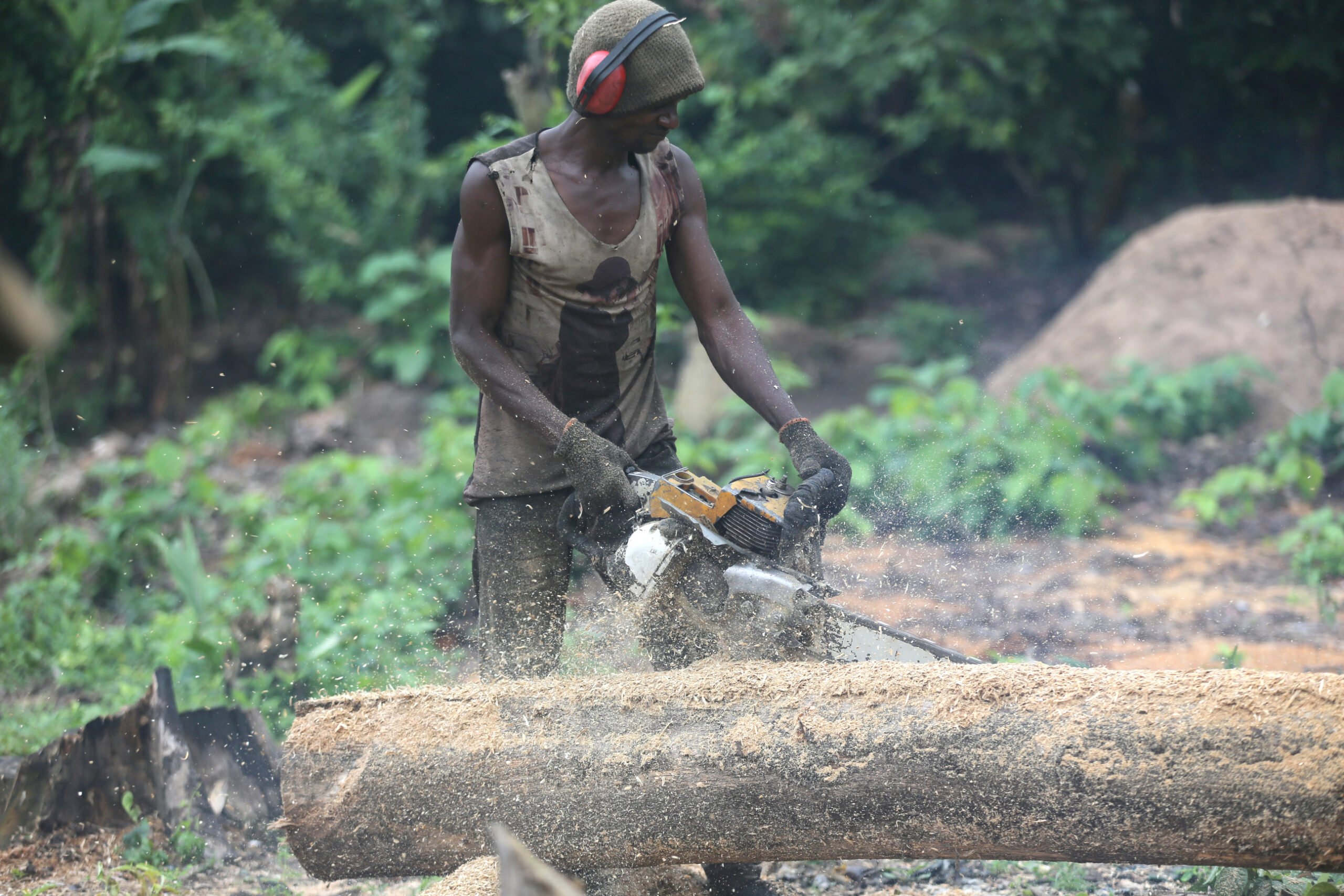
But reporting by CCIJ found that loggers are ignoring government efforts to regulate deforestation. Critics charge that government enforcement is lax. Gold mining is also destroying parts of the rainforest. The extensive destruction of forests is not only fueled by economic pressures and poor oversight, but community leaders are also spreading false claims about how cutting down trees will benefit the region. This includes disinformation that fewer trees will reduce the incidence of malaria, even though the scientific consensus documents that the loss of rainforest significantly increases the risk of disease.
From logging bans to illicit timber
The rich soil in these forests makes for land much sought after by farmers to plant cash crops like the African bush mango, pineapples, oil palm and cocoa, a key ingredient in chocolate that has increased in value, fueling new waves of planting.
Advertisement
As the demand for fertile lands for large-scale agriculture grows, farmers have been encroaching deeper into forest reserves. Investigations have shown how big agribusinesses contribute to this trend, sometimes carrying out large-scale logging under the guise of ‘salvage logging’—only clearing land for agriculture, cutting down wide swaths of forests to set up pineapple farms, cocoa plantations and oil palm estates.
However, some of these companies soon entered into the multimillion-dollar timber business, going deeper into the forest to chop centuries-old trees to feed the global demand for exotic hardwoods.
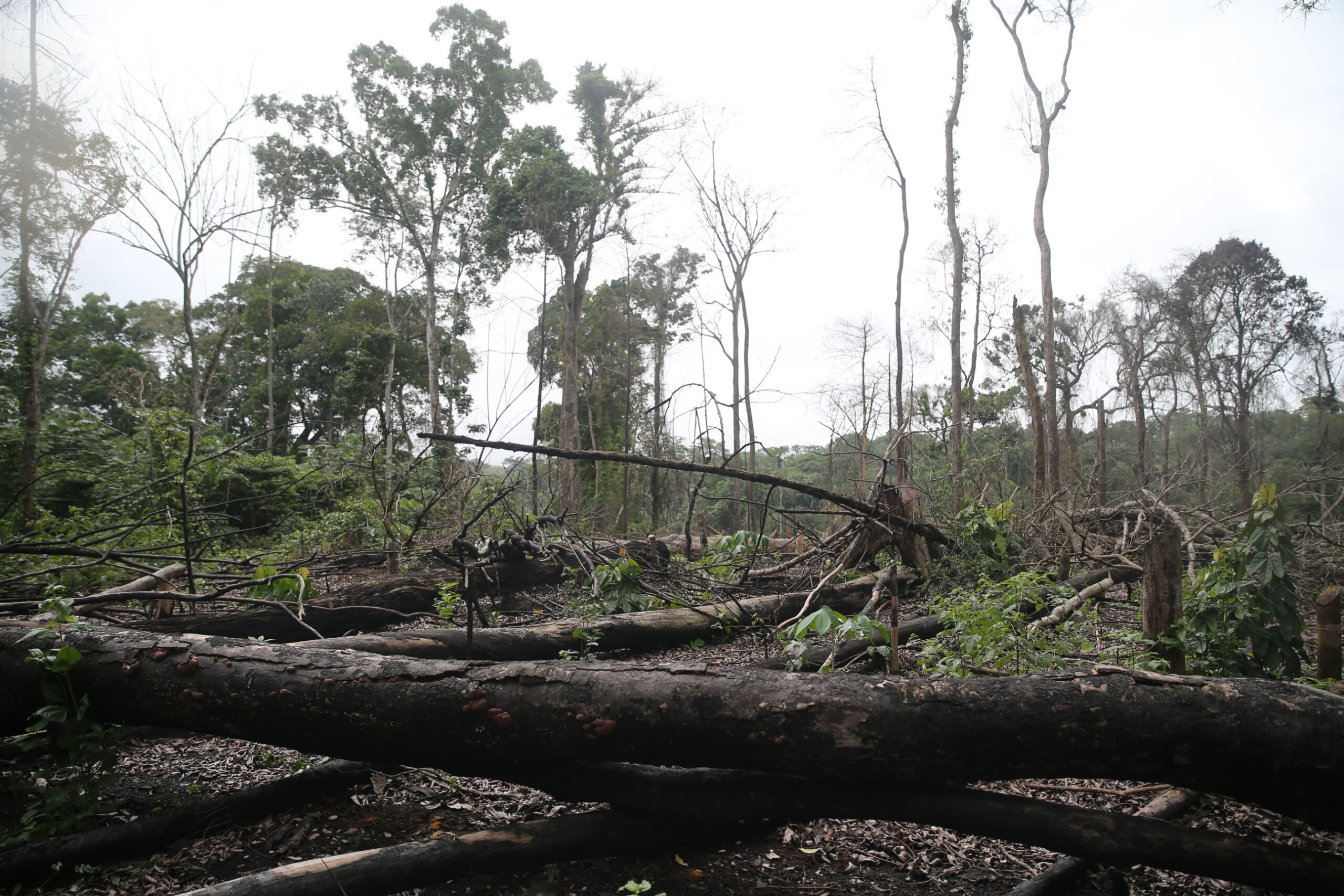
These companies claimed to have been granted official concessions by the Cross River State Government. But Bridget Nkor, head of the state’s UN Reducing Emissions from Deforestation and Forest Degradation project, known as REDD+, has refuted this claim. “No [government] concession of forest areas is given to any company that I know of,” Nkor said in a recent report.
In 2022, environmental groups alleged Dansa Agro, Wilmar International and 20 other agribusinesses engaged in illegal logging within Cross River’s protected forests, disguising their work as salvaging land for farming. Some of these companies engaged in the timber trade, processing and selling their timber products. An investigation by Premium Times earlier in the year, found these activities by agribusiness were carried out during a period of government-enforced ban (2008-2023). For instance, Dansa Agro was reported to have generated an estimated $2 million in annual revenue from timber exports.
Advertisement
Although lucrative, these logging activities have posed significant threats to Nigeria’s last rainforestan area that includes Cross River National Park, a lush region near Nigeria’s border with Cameroon. Efforts by successive governments in Cross River State to secure the forests have failed on the back of government complicity and lax enforcement. Governor Liyel Imoke’s statewide ban on logging in 2008, the creation of a Forestry Commission in 2010, and a militarised Anti-deforestation Task Force (ATF), were bold policies aimed at curbing deforestation in the state and prosecuting perpetrators.
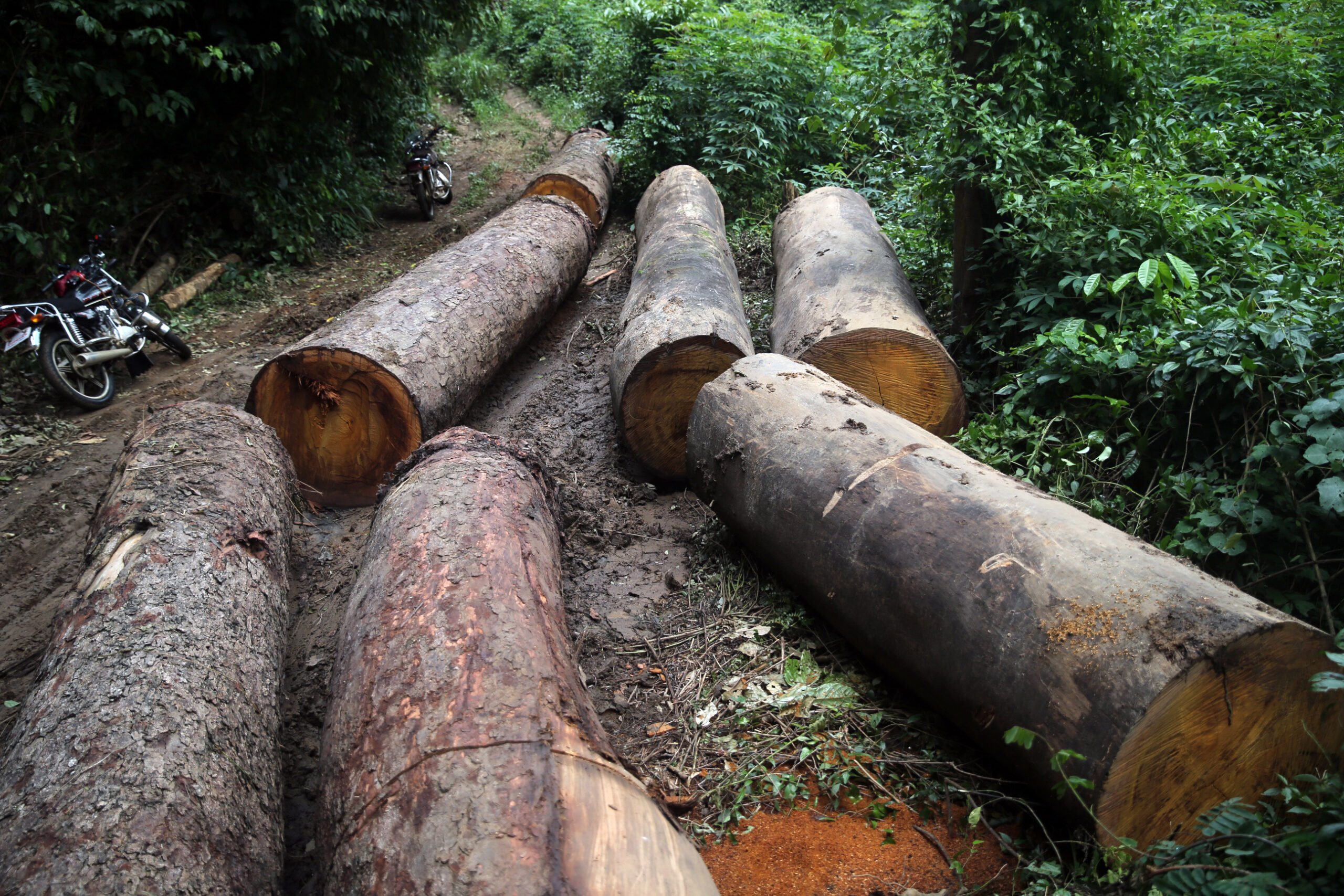
These policies supported Cross River as Nigeria’s pilot project for REDD+an initiative designed by the United Nations to help countries curb deforestation and promote sustainable forest management. Efforts by the ATF under American conservationist Peter Jenkins and, later, Nigerian environmentalist Odey Oyama, swept through with successful seizures of truckloads of timber, logging equipment, and the arrest of illegal loggers.
Advertisement
A youth leader, Ofum John, recalled how the ATF gave loggers a hard time.
“There was strong control,” he said. “My late father was a timber dealer then. When he was going to the bush, he would hide his sawing machine. You would hardly see any trucks of timber openly like we see now. Then, the ATF had some afforestation programmes too, and from time to time people were required to plant a certain number of trees.”
The anti-deforestation task force has raided forests and timber markets and arrested illegal loggers, confiscating trucks of timber, chainsaws and other logging equipment. In 2016, for instance, the ATF arrested 38 illegal loggers with 22 trucks of timber. In 2023, 32 trucks of allegedly illegal timber were impounded in the Yala area. The enforcement often led to violent clashes between illegal loggers and the ATF officials. In one 2009 incident, officials were beaten and stripped when illegal loggers attacked them with machetes. One of the officials, Effa Okongo, had his forefinger cut off.
Advertisement
The ATF also ran “Forest Na Life”, a weekly radio advocacy program to engage citizens and drive awareness on conservation issues. The name of the show is Nigerian pidgin english which translates as Forest Is Life.
Despite its successes, the agency was marred by allegations of corruption and complicity in aiding illicit logging. Oyama, who had to resign his appointment, said undue interference by the government undermined the ATF’s enforcement efforts, akin to “fetching water into a basket”.
Advertisement
Oyama said government officials, especially those at the Cross River State Forestry Commission, were complicit in the illegal logging business, sometimes even tipping off illegal loggers with internal classified information. “For instance, I will write a security memo to the state government and by the time I get to the field, the illegal loggers have a copy. It was a very risky job,” Oyama said.
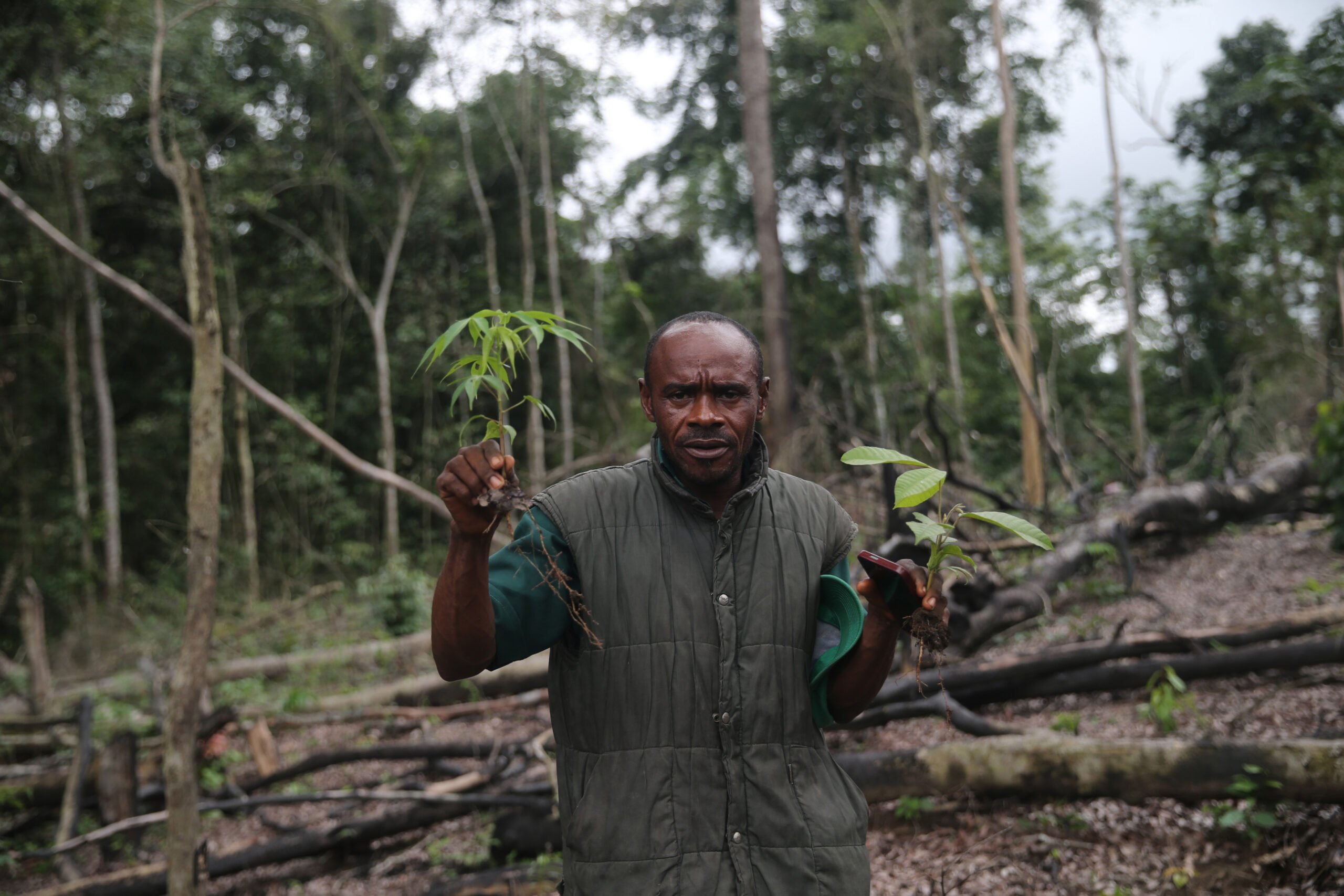
A proposed 160-mile-long superhighway project by Imoke’s successor Ben Ayade, with lanes cutting through the Cross River National Park, further cast doubts on the government’s commitment to protecting the state’s forests. Governor Ayade, only backed off in 2021 following intense pressure and backlash from local and international environmental groups.
Just weeks after assuming office in 2023, current governor Bassey Otu announced an end to the 15-year logging ban and also dissolved the ATF. Otu said it was part of the plans to revitalise the state’s Forestry Commission to meet current standards and generate revenue from the forest reserves.
But barely a year later, the governor reinstated the ban on all forms of logging in the state, citing loggers’ refusal to follow conservation measures that are part of the government’s logging permit system. Under that plan, the government granted permission for loggers to fell specific species of trees.
Despite the ban, full-scale logging continues
Despite the latest ban, illegal logging is still ongoing at a vast scale in Cross River communities, especially within the five local government areas which form the core of the state’s forestry cluster: Obubra, Yakurr, Ikom, Etung and Akamkpa. Here, truckloads of timber are a common sight along the roads, with just as many empty ones waiting to be filled with fresh timber.
For some weeks in July, CCIJ witnessed illegal logging in this region, carried out in the open. Roughly every 100 yards, logs of timber and sawn wood lay at loading points along the 55-mile road between Ikom and Boki local government areas, known as LGAs. At one of these points in Okwabang, Boki LGA, at least eight young men load piles of sawn timber onto the truck, using a makeshift ladder. Directly across them, the road leads to the Okwangwo Division of the Cross River National Park, one of the main strongholds for critically endangered animals, including Cross River gorillas, reported to is further threatened because of illicit logging.
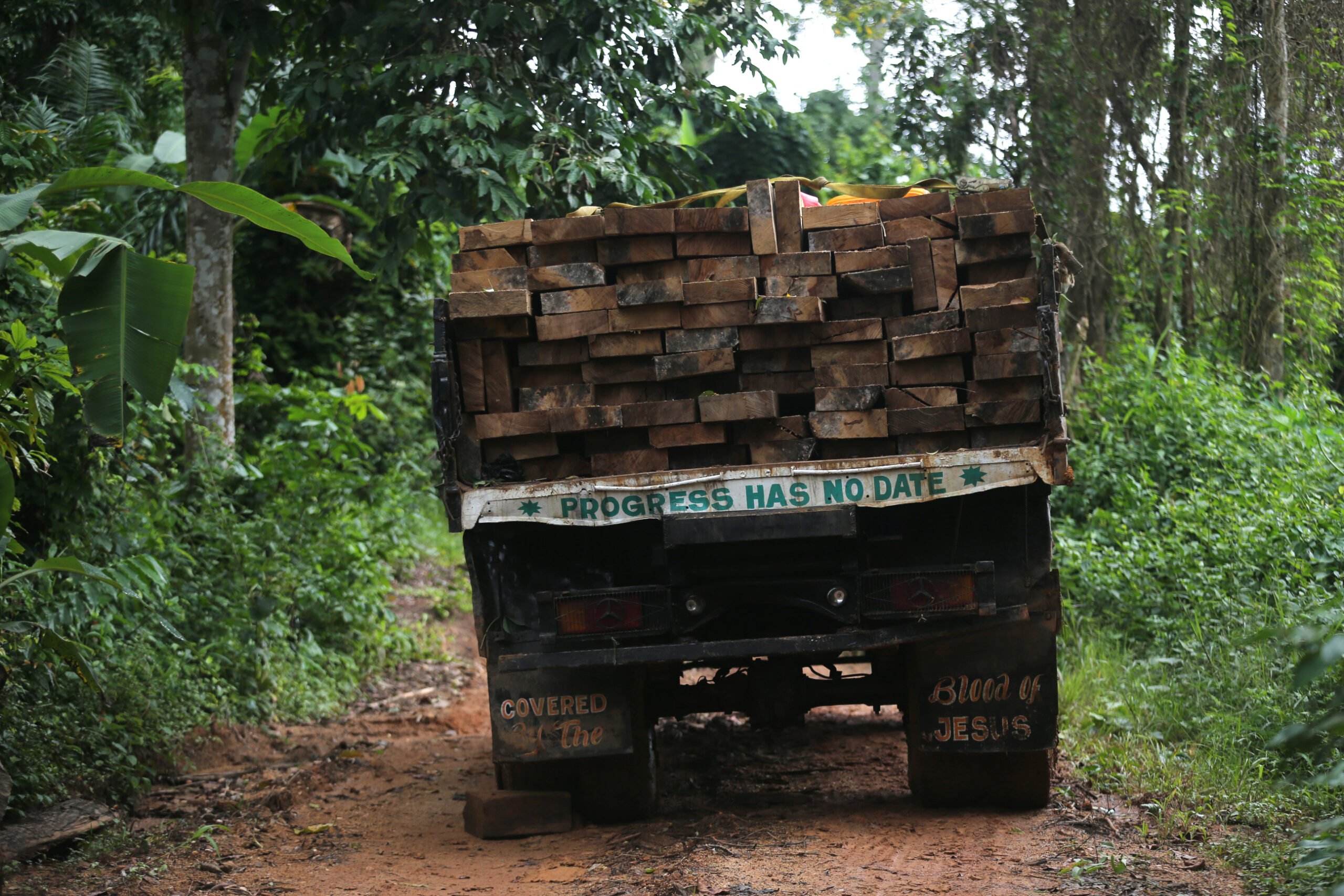
There were no signs that forestry officials or law enforcement agents were taking measures to prevent illegal timber cutting. Here, every person earns a living from the logging business – from finders, to operators, carriers and loaders, all facing economic hardship and the absence of alternative livelihoods.
“We survive on timber as our own source of income here,” one logger, Collins Okwor, told CCIJ. “We have nothing else to do, no jobs and no government support. Many of us and our families will go hungry if we stop logging.”
About 110 miles away in Agoi Ibami, Yakurr LGA, similar logging activities persist.
On a quiet Tuesday morning, Ikechukwu Okorie, aligned his old truck close to a pile of timber trunks. Its loud rumble echoes through the forests. With the help of two colleagues, he fastened a winch choker to one of the trunks, both ends still tacky with sap. As he pulled the chain through the snatch block, the pulley lifted the wood while his colleague carefully guided it onto the back of the truck. It is their first trip today. Two more and they are done here, Okorie said, rolling back the chains.
For a little more than a decade, Okorie has cut down trees and pulled their trunks out of the forests, ready to be chopped before onward transport to various destinations. “The timber goes to places like Ebonyi, Akwa Ibom and as far as the north (in northern Nigeria),” he said.
A little more than a mile from Okorie’s spot, other loggers struggle to pull out their truckload of apa logs stuck in the mud. One man digs around the front tyres with a shovel, and the other adds planks to create some friction on the track.
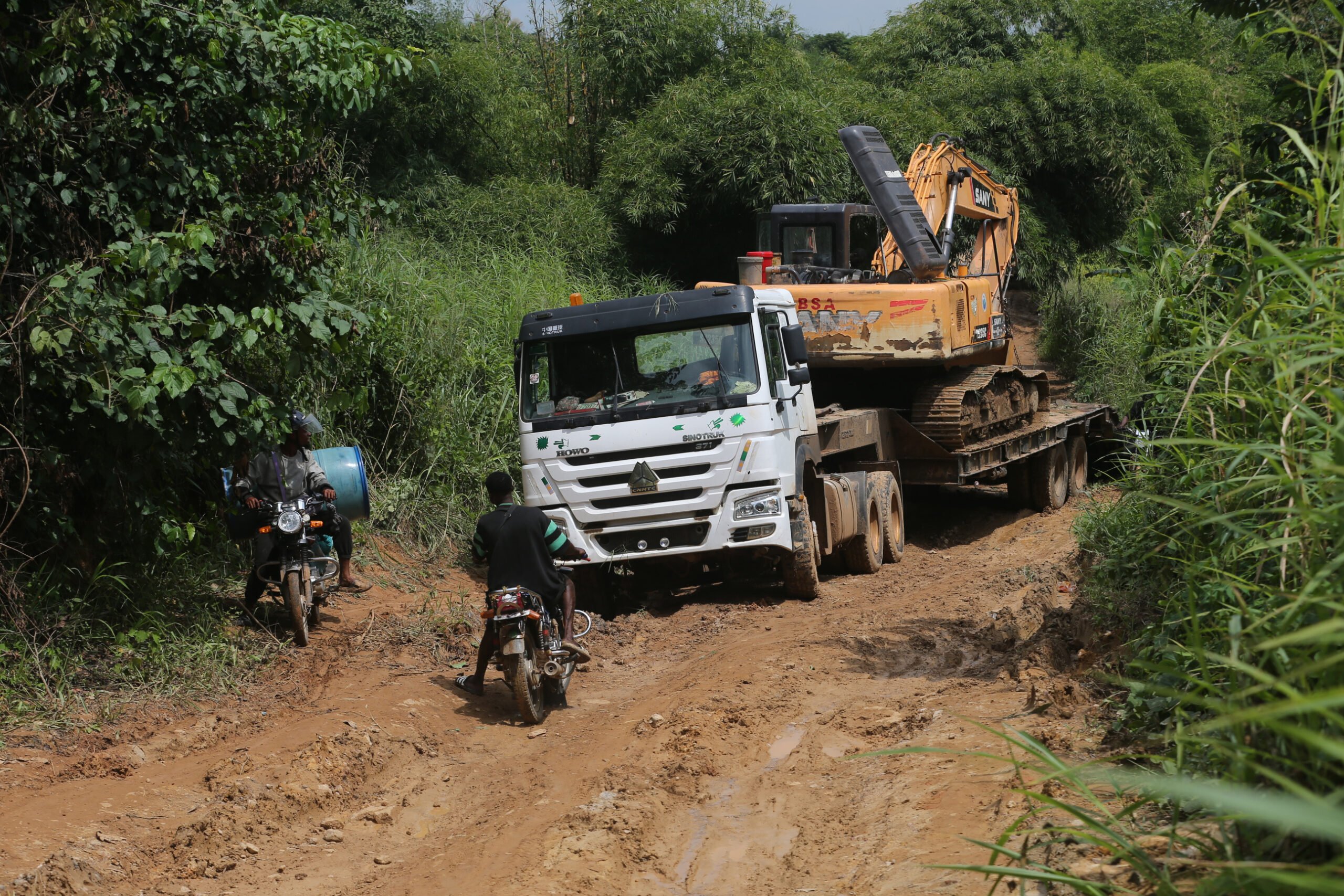
“There are many other loggers operating within these forests,” Bassey Akpama, who heads the EcoGuards, a community-based task force against logging, told CCIJ. He noted, however, that the protected forest areas were out of bounds and that loggers knew better than to encroach on them.
“They [loggers] can’t go there. They know. Because anybody we catch within the boundaries of the protected area will go in for it,” he said confidently. It would appear that only trees within these government forest reserves and conservation areas had immunity, while for others outside their boundaries—like the community forests—it is just a question of time before they meet the loggers’ chainsaw.
Gold mining expands in the region
Satellite imagery from the University of Maryland’s Global Forest Change, showed that Agoi Ibami lost 74 acres of tree cover between 2020 and 2024. The area gained only a fifth of an acre of new growth within the same period. This is not exclusively due to the massive plundering of forest trees by loggers and farmers, but also due to gold mining deep into the forest.
The recent discovery of gold in communities like Agoi Ibami and Agoi Ekpo has drawn the influx of miners from across the country, including foreigners from neighbouring Niger. To access gold deposits buried beneath the ground, the miners have cleared large swathes of trees and excavated the soil with the use of bulldozers.
To extract gold, artisanal gold miners often use cyanide and mercury, two poisonous materials with degrading impacts on the environment and toxic effects on humans and animals, even at very low levels of exposure. In Zamfara, Northern Nigeria, lead poisoning from gold mining led to the death of at least 400 children in 2010, with many more exposed to severe health risks.
There are also concerns over security threats posed by the influx of miners, especially foreigners, in the communities. In January, the Attah, a traditional ruler of Agoi Ekpo, Michael Onun Mbang, raised security concerns over foreigners illegally mining gold in the communities’ forests. This led the State’s Security Adviser, Major General Ubi-Obono, to order the illegal miners to vacate the forests. Multiple locals who spoke to CCIJ confirmed that many of the foreigners were still present in the forests.
Rich in resources but living in hardship
Despite being a vast reservoir of forestry, gold and other rich natural resources, Cross River communities suffer neglect and lack social amenities that would improve life for their population. The roads are hardly drivable due to the movement of heavy machinery and the busy traffic of heavy trucks transporting timber out of the communities. There are no public water works and no electricity. For instance, the single road leading into the Agoi community through neighbouring Mkpani, has been dilapidated for years, making it impassable for vehicles, especially during the rainy season.
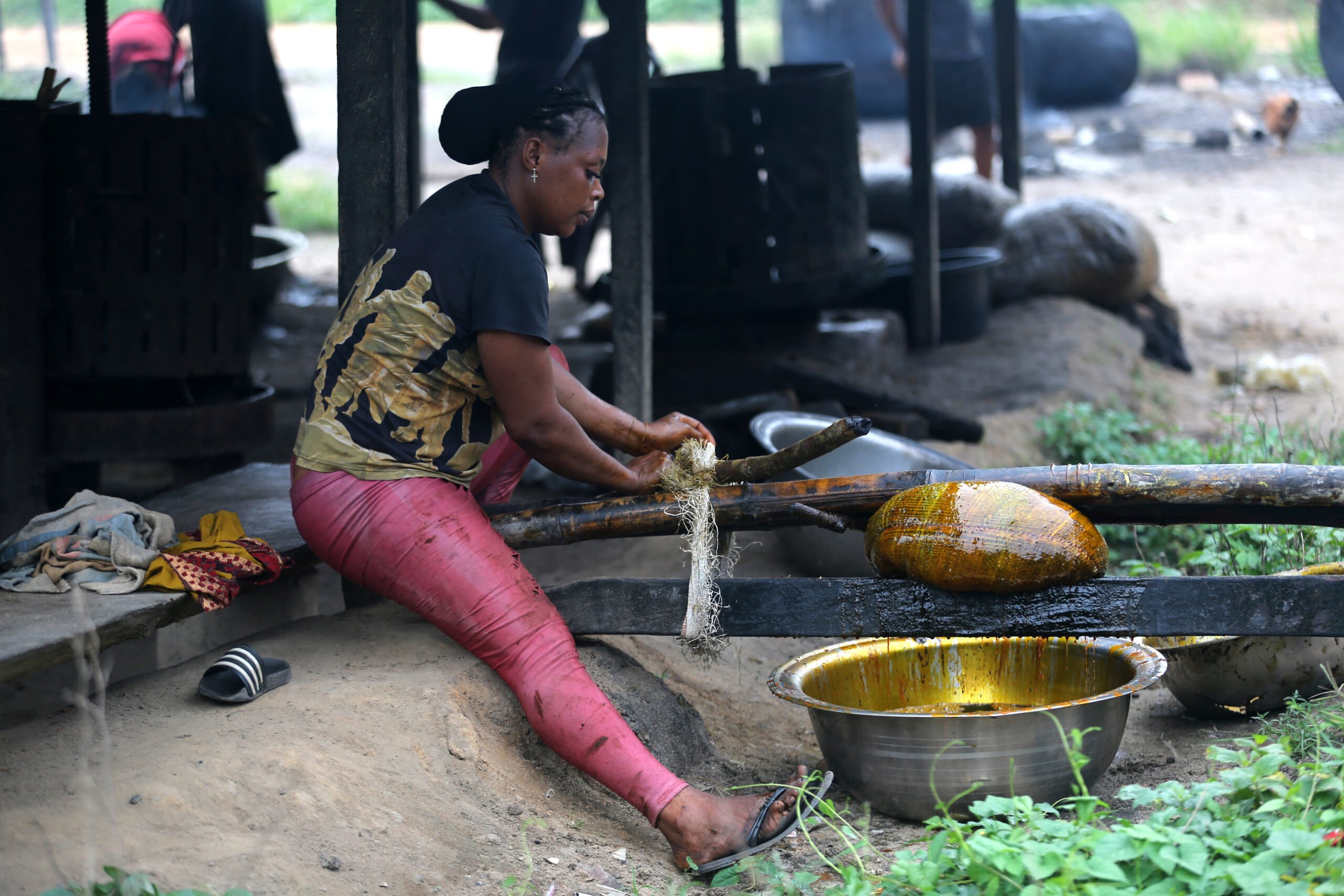
“Look at this place, does it look like a place that produces all these resources? You saw the state of our roads on your way here,” community leader Etim Aitu said.
The same reality occurred many kilometres away in Okwabang, Ekuri, Ochon, Ekori, amongst other forest communities that CCIJ visited. Most of these communities have been in darkness for over a decade, relying largely on generators and solar power owned by a privileged few. For instance, multiple residents in Ochon and Ekori confirmed that their communities last saw electricity in 2014.
Logging fueled by disinformation
Beyond poverty and other economic reasons, the devastation of Nigeria’s last rainforest is also fueled by disinformation widely held across communities.
One of such narratives claims that the forests constitute a health risk to residents, breeding mosquitoes and contributing to malaria in the communities. Community chief Genesis Aria is one of those who consider the forest complicit in the spread of malaria, having lost his mother to the disease as a child.
“As of 1996, when I was growing up, I discovered that our people were dying of malaria. My mother was also affected; she had severe malaria, and we lost her,” he told CCIJ. So, to rid the community of malaria, he says the trees must fall.
“We decided to cut down those trees to reduce the number of mosquitoes. Before now, they (the government) were giving us mosquito nets to protect us from mosquitoes, but for like 6 years now, they have stopped bringing those mosquito nets. Almost every month, we take our children, including ourselves, to the hospital, and we spend money there,” he said.
Since his foray into the logging business, Chief Genesis said he has cut down over 2,000 trees.
Malaria is still endemic in Nigeria. Reports and scientific studies reviewed by CCIJ identified deforestation as a significant way that humans contribute to the spread of malaria, accounting for a 5% increase in cases among children in rural Nigeria.
Several studies detailed how deforestation increases the risk of the disease, emphasising that nations with higher rates of deforestation also tend to have higher rates of malaria.
The result, according to a University of Florida analysis of 17 scientific studies, is that slightly more than half of mosquitoes in deforested habitats were confirmed to be carrying malaria, more than twice as many as those in forested areas.
In Yakurr and Boki LGAs, CCIJ observed that the forested areas where illegal loggers cut trees are located at least three to four miles (5-6 km) away from human settlements. This long distance naturally provides a buffer zone between the forests and settlements, which significantly reduces the risk of malaria transmission, as disease-borne mosquitoes do not travel more than a mile or so from their habitats.
Another factor affecting mosquitoes is rising temperatures.
Thermal data obtained by CCIJ from these locations—Agoi Ibami and Inyang Iba (Yakurr LGA)—in Cross Rivers State show temperatures on the ground increased in places where trees were cleared, there was less shade, and the soil was exposed to more sunlight. Temperatures increased as much as 9 degrees Fahrenheit (+5℃). Higher temperatures may contribute to malaria-carrying Anopheles gambiae becoming more able to transmit disease, according to studies that have appeared in The Lancet, Nature and other scientific publications.
That is not the only disinformation spread about cutting down rainforests.
In some quarters, it is believed that the forests exist eternally and, as such, will continue to regrow and replenish no matter how many trees are cut down.
Collins Okwor, a resident also in the logging business, likens forest life to the nature of the evolving human population. Timber is just like the human race, he said as he enjoyed a game of cards. “As older people die, more are born, and the younger ones grow. In the forest, we have young trees; when the older ones are cut off, the younger ones will surely grow up,” he said.
His opponent, Collins Obi nodded in agreement, his gaze still on his cards, seemingly plotting his next move. “We cannot exhaust the timber in the forest. The more you cut, the more others grow. So, it is impossible for them to be exhausted,” he said.
The science is less clear. It can take years for a rainforest to regrow. The projections vary depending on whether scientists are looking for positive signs, like biodiversity and soil recovery, to the forest returning to how it was before. It might take from a couple of decades for the first stages of recovery to more than a century when trees and animals might fully return.
Others argue that the loggers are rendering a sort of social service to the communities by using their bulldozers and graders to create access roads in the forests that have helped farmers access their farms easily.
Sylvester Amah, a cocoa farmer living in Boki local government area, said the government’s neglect and failure to provide social services to the community has caused them to rely on loggers for access roads. Repeated requests for comment from CCIJ to the Cross River Forestry Commission, even through the state’s chapter of the Nigerian Environmental Society, were not responded to.
Already ravaged by desertification in the North, the rapid disappearance of Nigeria’s remaining rainforest in the South due to the ongoing massive deforestation spells a looming environmental crisis that threatens critical ecosystems and intensifies the country’s climate challenges.
Odey Oyama said illegal logging in Cross River persists due to the government’s neglect of environmental conservation and lax enforcement by its agencies. “The Forestry Commission is not working. None of the agencies responsible for this issue is working. The government just stays in Calabar and makes funny pronouncements. There is nothing like environmental protection in the state,” he told CCIJ.
Oyama, who once led the ATF, has been one of the critical voices leading advocacy for the preservation of the state’s forests with his Rainforest Resource and Development Centre. Others include Chief Edwin Ogar and Martins Egot of the internationally recognised community-based conservation group Ekuri Initiative. Chief Ogar, who also championed campaigns and lawsuits against forest encroachment in the state, died in February 2025 after a brief illness.
“He is dead, but his legacy continues to live on,” Cosmas Ogar, his brother, who is also a conservationist, said. “Chief Edwin did a lot for the people and our forests; we will do all we can to continue from where he stopped.”
